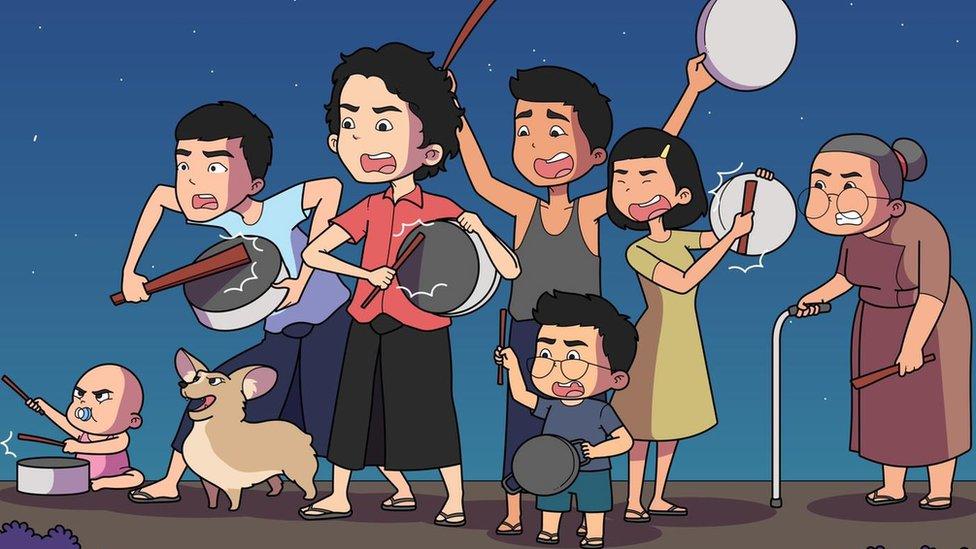Myanmar coup: Woman shot at protest fights for life
- Published
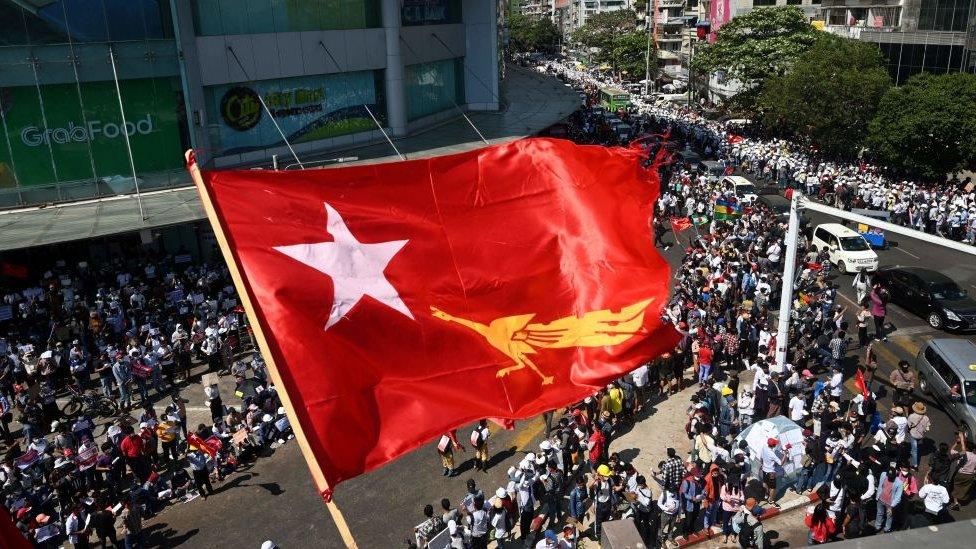
The flag of Ms Suu Kyi's National League for Democracy party flew over protesters in Yangon
A woman who was shot in the head while protesting against Myanmar's military coup is in a critical condition at a hospital in the capital Nay Pyi Taw.
Mya Thwe Thwe Khaing, 19, was hurt on Tuesday when police tried to disperse protesters using water cannon, rubber bullets and live rounds.
The wound was consistent with one from live ammunition, rights groups say.
US President Joe Biden says his government will impose sanctions on those responsible for the coup.
Mr Biden said the sanctions would focus on military leaders and their family members along with their business interests. The US will also enforce strong export controls.
"The people of Burma are making their voices heard and the world is watching," he said, vowing to take further action if needed.
"As protests grow, violence against those exerting their democratic rights is unacceptable and we're going to keep calling it out," he added.
There have been reports of serious injuries as police have increased their use of force, but no deaths so far.
Meanwhile, dozens of police officers joined protesters in eastern Kayah state.
Tens of thousands have turned out in street protests against last week's coup, which overthrew Aung San Suu Kyi's democratically-elected government in the South East Asian country, despite a recent ban on large gatherings and a night curfew.
Demonstrations re-started on Wednesday morning, for a fifth consecutive day, with a large group of civil servants gathering in Nay Pyi Taw to protest.
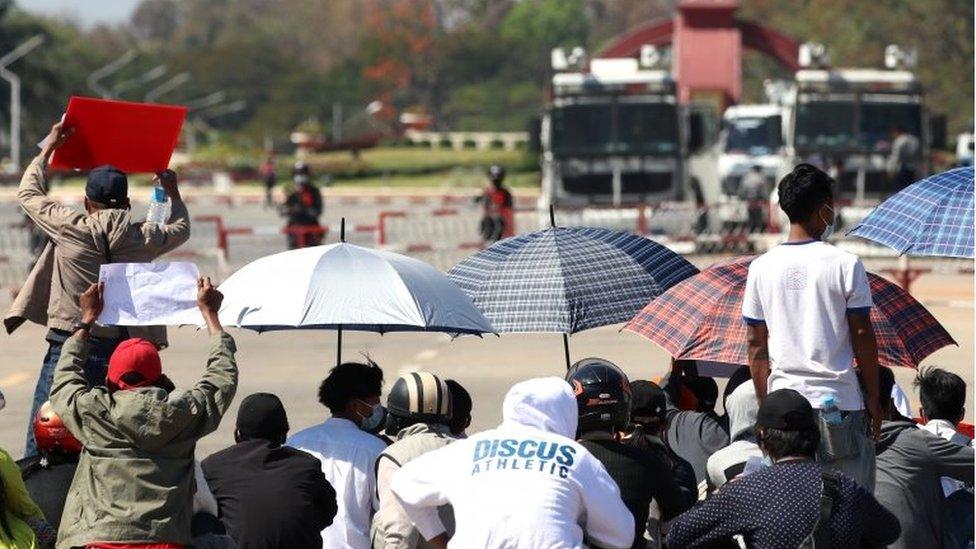
Demonstrations have now entered their fifth consecutive day
On Tuesday, police used water cannon in Nay Pyi Taw against protesters, who refused to retreat.
Warning shots were reportedly fired into the air before rubber bullets were used. Doctors later said it appeared live ammunition had hit protesters.
According to BBC Burmese, who spoke to an unnamed medical officer from a Nay Pyi Taw hospital, Mya Thwe Thwe Khaing suffered a serious head injury and another demonstrator had chest injuries.
Mya Thwe Thwe Khaing, who turns 20 on Thursday, is now in intensive care.
Her sister, Mya Tha Toe Nwe, who was also at the protest, said the chances of her sister surviving are slim.
"It's heart breaking," she said. "We only have our mother, our dad is already dead.
"I'm the eldest of four siblings, she's the youngest. I can't comfort mum, we have no words."
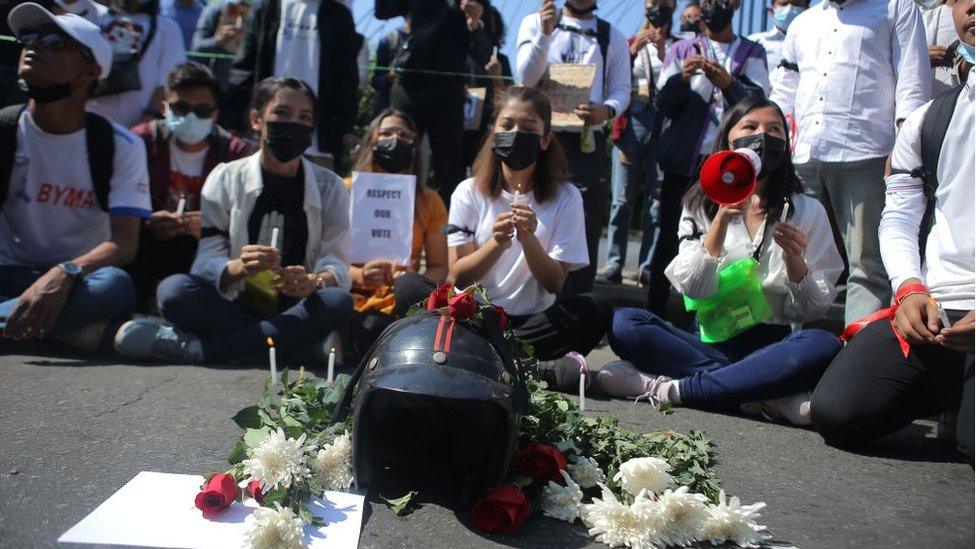
Protesters offered candles and flowers for the 19-year-old who was shot on Tuesday
The injured woman's brother Ye Htut Aung told the Reuters news agency she had insisted on protesting, and that he spoke to her on the phone shortly before she was shot.
"What are you going to do if they shoot?" he reportedly asked.
"No, they wouldn't," she replied. "It's OK. Even if they fire, it should be fine."
According to a report by Human Rights Watch,, external a doctor from the hospital said the teenager had a "projectile lodged in her head and had lost significant brain function".
The unidentified doctor said the wound was consistent with the use of live ammunition, and that a metal bullet had penetrated the back of the injured woman's right ear. A man wounded at the same protest also appeared to have similar injuries.
A separate report by Fortify Rights, external quoted a doctor who said the woman was brain dead from an "imminently fatal gunshot wound to the head".
Police in Myanmar used water cannon and rubber bullets on protesters
Earlier, a clip purportedly showing a woman being shot circulated online. The footage shows the woman wearing a motorbike helmet collapsing abruptly.
Separately, pictures on social media showed what appeared to be a blood-stained helmet. The BBC has not verified the authenticity of the images.
The United Nations special rapporteur on Myanmar has warned the country's security forces that they face prosecution under international law if they use excessive force against demonstrators.
"Myanmar military personnel and police need to know that 'following orders' is no defence for committing atrocities and any such defence will fail, regardless of their place in the chain of command," Thomas Andrews said in a statement issued in Geneva.
He said that "hundreds of arbitrary detentions" had been recorded since the coup.
Previous protests against the country's decades-long military rule, in 1988 and 2007, saw large numbers of demonstrators killed by the security forces. At least 3,000 protesters died in 1988 and at least 30 people lost their lives in 2007. Thousands were imprisoned during both sets of events.
Late on Tuesday, Myanmar's military also raided Ms Suu Kyi's National League for Democracy (NLD) party headquarters in the country's largest city, Yangon, the party said.
BBC Burmese understands that security forces broke down the doors by force. No party members were present in the building at the time. Footage of the headquarters filmed by the AFP news agency showed damaged computer servers and ransacked cupboards.
The raid took place during a nationwide curfew, which lasts from 20:00 to 04:00 (13:30 to 21:30 GMT).
What about the police protest?
In eastern Kayah state, dozens of police officers appeared to have joined the protesters' cause and staged their own demonstration.
According to the local news outlet Myanmar Now, they were holding posters that read "We stand with the people" and "We don't want the dictatorship".
One protester at the scene told the BBC that as many as 40 officers took part and they were later seen trying to protect the demonstrators from other police.
Another eyewitness said some of the police protesters were later arrested.
Allow X content?
This article contains content provided by X. We ask for your permission before anything is loaded, as they may be using cookies and other technologies. You may want to read X’s cookie policy, external and privacy policy, external before accepting. To view this content choose ‘accept and continue’.

Meanwhile, large crowds continued to gather in various cities, including Nay Pyi Taw and Yangon.
Several groups of young people staged colourful protests wearing ball gowns and sitting in inflatable tubs.
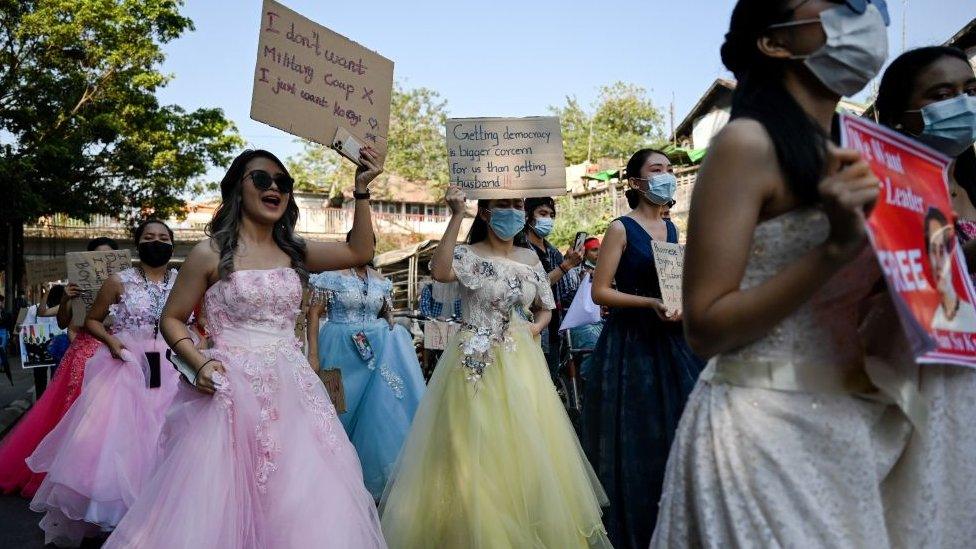
Young women protesting in Yangon were spotted wearing ball gowns
Why are people protesting?
The military seized control on 1 February following a general election which the NLD won by a landslide.
The armed forces had backed the opposition, who were demanding a rerun of the vote, claiming widespread fraud. The election commission said there was no evidence to support these claims.
The coup was staged as a new session of parliament was set to open.
Ms Suu Kyi is under house arrest and has been charged with possessing illegally imported walkie-talkies. Many other NLD officials have also been detained.

Myanmar - the basics
Myanmar, also known as Burma, was long considered a pariah state while under the rule of an oppressive military junta from 1962 to 2011
A gradual liberalisation began in 2010, leading to free elections in 2015 and the installation of a government led by veteran opposition leader Aung San Suu Kyi the following year
In 2017, Myanmar's army responded to attacks on police by Rohingya militants with a deadly crackdown, driving more than half a million Rohingya Muslims across the border into Bangladesh in what the UN later called a "textbook example of ethnic cleansing"
Aung San Suu Kyi and her government were overthrown in an army coup on 1 February following a landslide NLD win in November's election

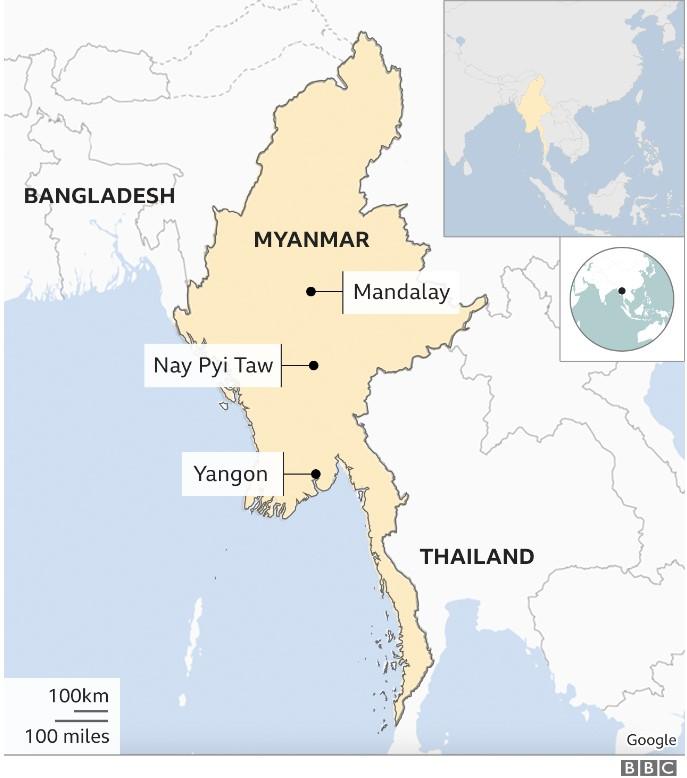
Related topics
- Published9 February 2021
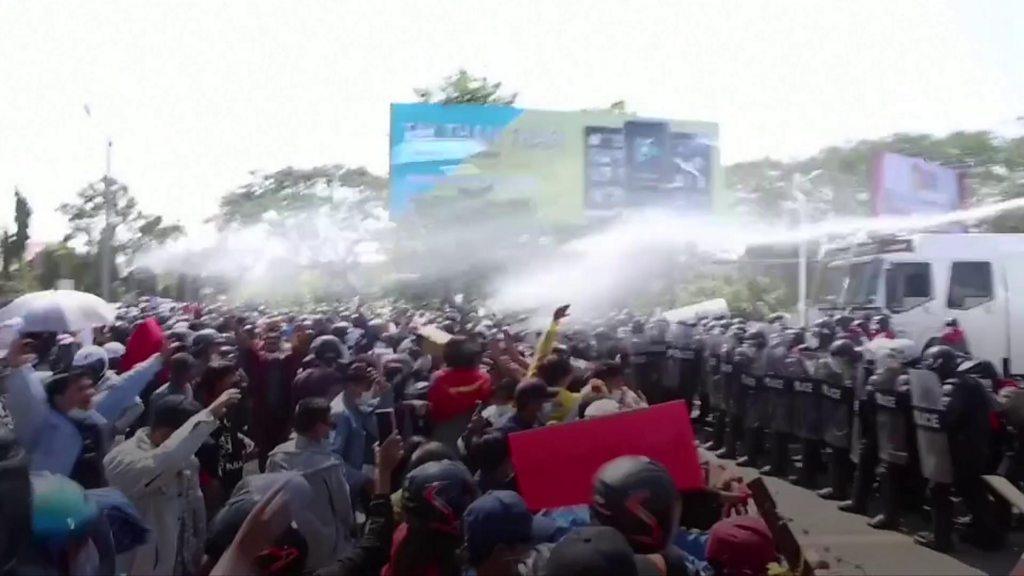
- Published8 February 2021
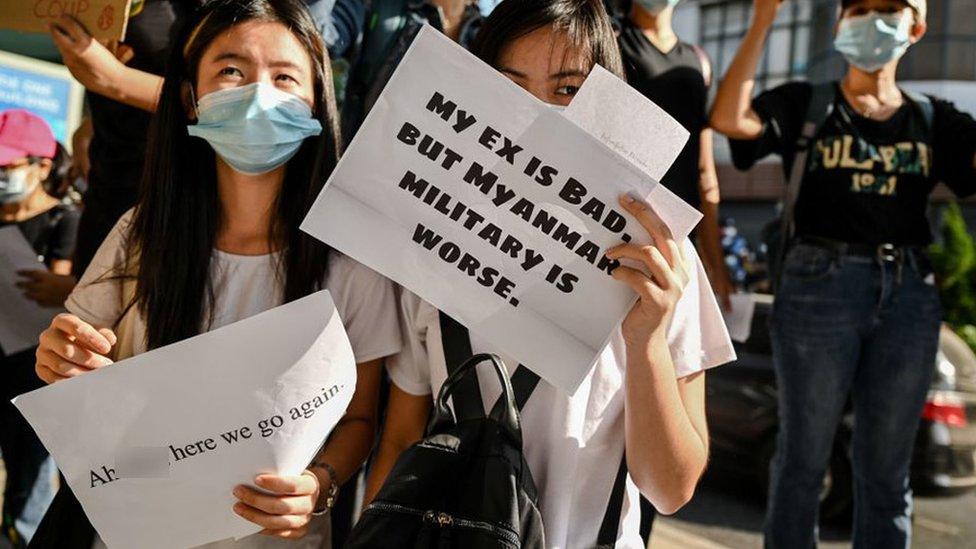
- Published6 December 2021
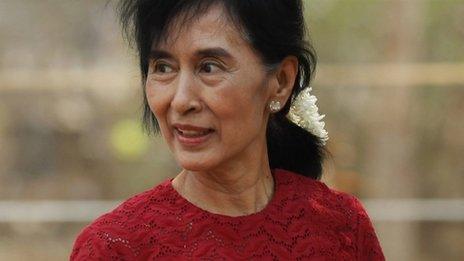
- Published25 July 2022
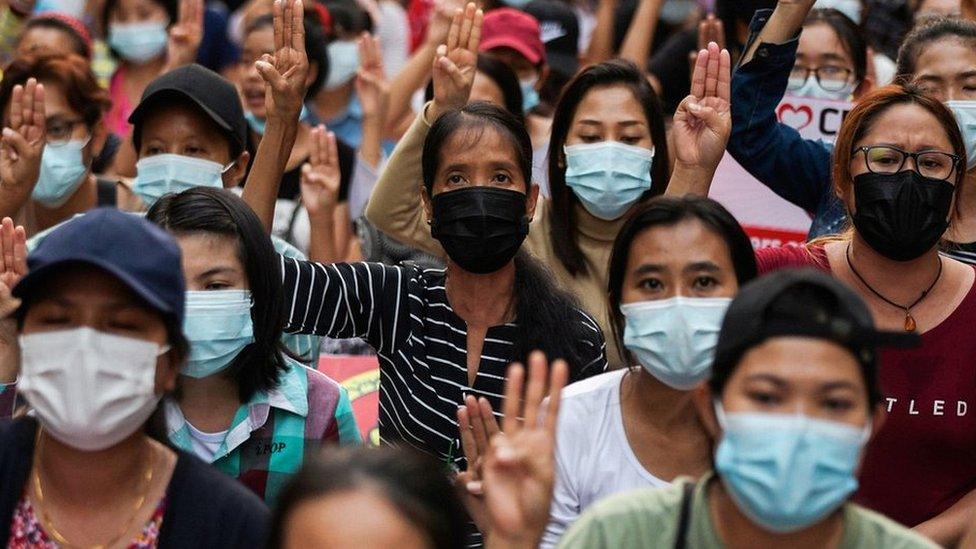
- Published7 February 2021
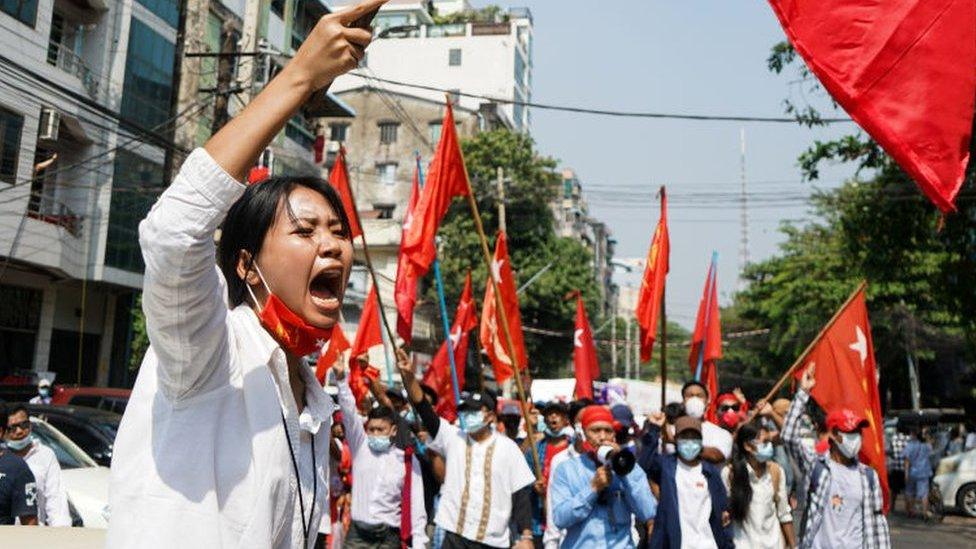
- Published4 February 2021
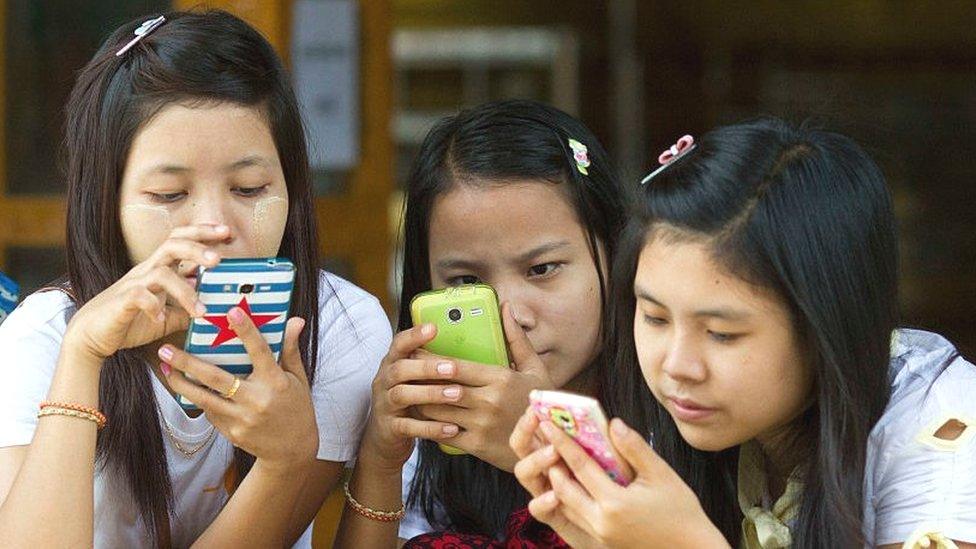
- Published7 February 2021
